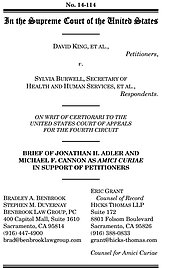Learn more about Cato’s Amicus Briefs Program.
The Patient Protection and Affordable Care Act of 2010 (“PPACA”), Pub. L. No. 111–148, 124 Stat. 119, authorizes tax credits for the purchase of health insurance in state-established Exchanges, and only in such Exchanges. Insofar as the IRS has sought to provide tax credits for the purchase of health insurance in federally established Exchanges, its actions are contrary to law and must be set aside.
Section 1311 of the PPACA (42 U.S.C. § 18031) declares that “Each State shall … establish” an “Exchange” to regulate health insurance within the state. Section 1321 (42 U.S.C. § 18041) directs the federal government to “establish” Exchanges “within” states that “[f]ail[] to establish [an] Exchange” or implement other specified provisions of the Act. Section 1401 (26 U.S.C. § 36B) offers health-insurance “tax credits” to certain taxpayers who enroll in a qualified health plan “through an Exchange established by the State.” The statute limits tax credits to state established Exchanges in a manner that is plain and unambiguous. The remainder of the statute and the PPACA’s legislative history are fully consistent with those provisions.
Such conditions are not anomalous. To induce state cooperation, Congress routinely conditions federal benefits to individuals — via both direct spending and the tax code — on their states carrying out congressional priorities. Congress conditioned federal subsidies on state action on multiple occasions throughout the PPACA. It did so here as well.
The text of the PPACA is sufficient to resolve this case. Resort to legislative history only reinforces this conclusion. That history supports the plain meaning of the text, and reveals why PPACA supporters approved this requirement even if many of them would have preferred otherwise. Political necessity required the Act’s authors to give states a leading role in operating health-insurance Exchanges. In so doing, the Act’s authors expressly conditioned premium-assistance tax credits on states establishing Exchanges and performing other tasks. Many of the Act’s supporters preferred a different approach. But after those supporters lost their filibuster-proof majority in the U.S. Senate, no other approach could satisfy the constitutional requirements of bicameralism and presentment.
In 2012, the Internal Revenue Service issued a rule that altered that political tradeoff. The IRS rule offers premium-assistance tax credits through Exchanges that were established not by the State, but rather by the federal government. The agency is presently issuing those tax credits in the 36 states that refused or otherwise failed to establish an Exchange.
The IRS rule is contrary to the plain language of the PPACA. The statutory text speaks directly to the question at issue. Thus the IRS has no authority to provide tax credits in federal Exchanges. Nor is the IRS due deference in its interpretation of the Act. Contrary to the Government’s argument that the rule supports one of the Act’s general goals, the rule actually subverts congressional intent by altering the balance Congress struck between the Act’s competing goals. It tries to achieve through regulatory fiat what PPACA supporters could not achieve through the political process: a health care bill that does not rely on state cooperation.
The Government has not identified any statutory provisions that conflict with the plain meaning of the PPACA’s tax-credit eligibility provisions. Nor has the agency identified a single contemporaneous statement indicating PPACA supporters expected this bill to offer tax credits in federal Exchanges. The IRS simply rewrote the statute. The IRS’s regulation is therefore contrary to law and should be set aside.

This work is licensed under a Creative Commons Attribution-NonCommercial-ShareAlike 4.0 International License.


